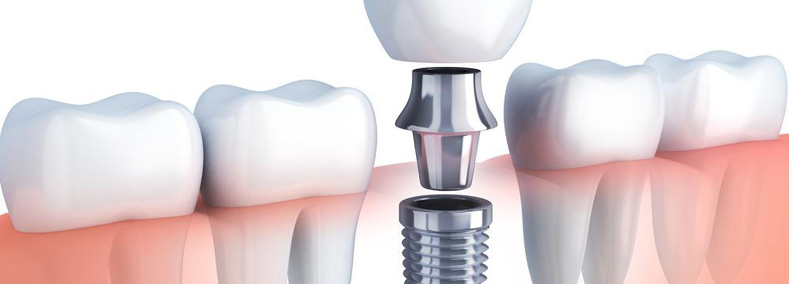Dental Implants – the most precious gift to humankind from modern dentistry; natural-like teeth look and functions! “Dental implants are really the next best thing to your natural teeth” – People of all ages have huge benefits from them!
Dental implants are the restorative prostheses that are usually the titanium fixtures, screwed into jawbone; mainly working as an anchor, holding a tooth/a set of teeth on it. Following this, they will then hold the crown, bridge or denture a very way that your tooth root would typically grip the natural teeth. Dental implants are highly successful. They are the best alternative for types of bridges and removable partial or full dentures; truly, the most permanent dental solution!
Major Benefits of Dental Implants

Superb biting force similar to natural teeth – is what you would definitely get with dental implants; very unlike dentures with restricted force; efficient chewing and therefore a better digestion is your improved health too.

Dental implants are the most stable prosthesis that would have solid integration with your jawbone – enabling patients to speak confidently without any fear of getting them slipped while in use – to denture wearers, dental implants are certainly a miracle!

Dental Implants with crowns or bridges fixed within – are the most pleasant oral appearance one would love to see the most; very close to natural teeth. You would get an empty space in your mouth lined up with such beautiful teeth – and an enhanced smile, greatly precious!

Feel Confident Fortunately, the dental implant-supported dentures are the real magic. Denture wearers will have them fixed as fabricated with reduced extensions; eliminating extra bulk that they once felt with old dentures. No risk of slipping and sliding with firm stability in your mouth.

Now what? With your eating, speaking and smiling abilities being re-active – you would definitely feel quite self-esteemed and would love to visit your society with a lovely smile; all your past fear of wearing the separate dentures will just be lost!
Dental Implants Recovery
what can I expect after treatment?
Dental Implants would clearly work the same as your original teeth. They require similar care that you would seek from your natural teeth. Oral hygiene and regular dental visits are essentials to keep your implants clean and plaque-free. Appropriate teeth cleaning techniques and flossing will keep your implants in healthy states.
Post-treatment, the periodic implant checkups are scheduled to see if your teeth, gums are doing well; ensuring that you remain in better oral health.
Nobel Direct implants offer great simplicity and are highly integrated with soft tissues. Dental implants are strong composites of single piece titanium that includes both implant body and an integral fixed abutment. Patients are comfortable due to a less-invasive procedure; typically, attributed to its one-piece design that makes the surgery flapless. Nobel Direct does also take little surgical time compared to historical implants.
Owing to improved treatment protocols and an excellent surface of implants (Ti Unite), they have the fastest recovery time. The Immediate Function procedure is a great clinical ease to both dentists and patients; making implants act like purely original, adding immediate relief and great quality to life.
Process of Dental Implants
Dental Implant Restoration is truly a great invention of contemporary dentistry – bringing one the most indistinguishable teeth, close to natural ones. It’s a complete structural and functional integration; owing to various dental implants functions and their strong adherence to living bone (providing better and faster Osseo integration). Such Osseo integrated implants will take approximately three to six months to properly anchor and heal for crown to be restored with. If Osseo integration does not happen, the implants will just fail.
Preparation for Dental Implants
Dental implantation can usually be performed after adolescence period, when one achieves fully grown bones. One with medical conditions like diabetes, cancer or periodontal diseases would require extra treatments prior to going for dental implantation.
Overview of Dental Implant Procedure
Initially, the dental implant placement requires a drilling into the bone – for titanium screw and crown to be fixed within. The “Pivot Hole” (a small-diameter hole) is made at place/s where there are no teeth (edentulous) so as to guide the titanium screw, which will firmly support the dental implants in situ. Equipments of the great industry standards and speed will avoid sort of burning to jawbone; allowing enough time for bone to integrate and grow surrounding the implants and for crowns to be fixed over implants. An immediate loading of mini dental implants is available too.
Advanced Dental Implants
It is purely the dentist’s skills and expertise that they would protect the jaw and face structures from any accidental damage – especially while creating a pivot hole and sizing the jawbone. In many cases, the surgical guides are used on the basis of CT scans – while fixing dental implants. While drilling, the dentist must be careful to avoid any damage to nerves, bone cells and other structures.
The dentist will have the implant screws that may be self-tapping; getting them fixed at a precise torque in situ – preventing overloading, overheating or pressurization to surrounding bone.
With the pivot hole being drilled onto proper jaw site, it will also broaden up to allow the precise implant screw placement in place. Once fixed, the neighboring tissues are secured over the implant; placing the protective cover screw on top in order to ensure better site healing and Osseo integration.
Depending on a favorable healing around two to six months later, the implants will be uncovered, allowing an abutment (that would hold the crown or teeth replacement) to attach to them. With an abutment once in place, the dentist will then form the temporary crown; serving as template around that the gums will grow and shape themselves in natural ways. The process is ended when your dentist will replace the temporary crown with a permanent crown
Whatsapp Now Contact Now
